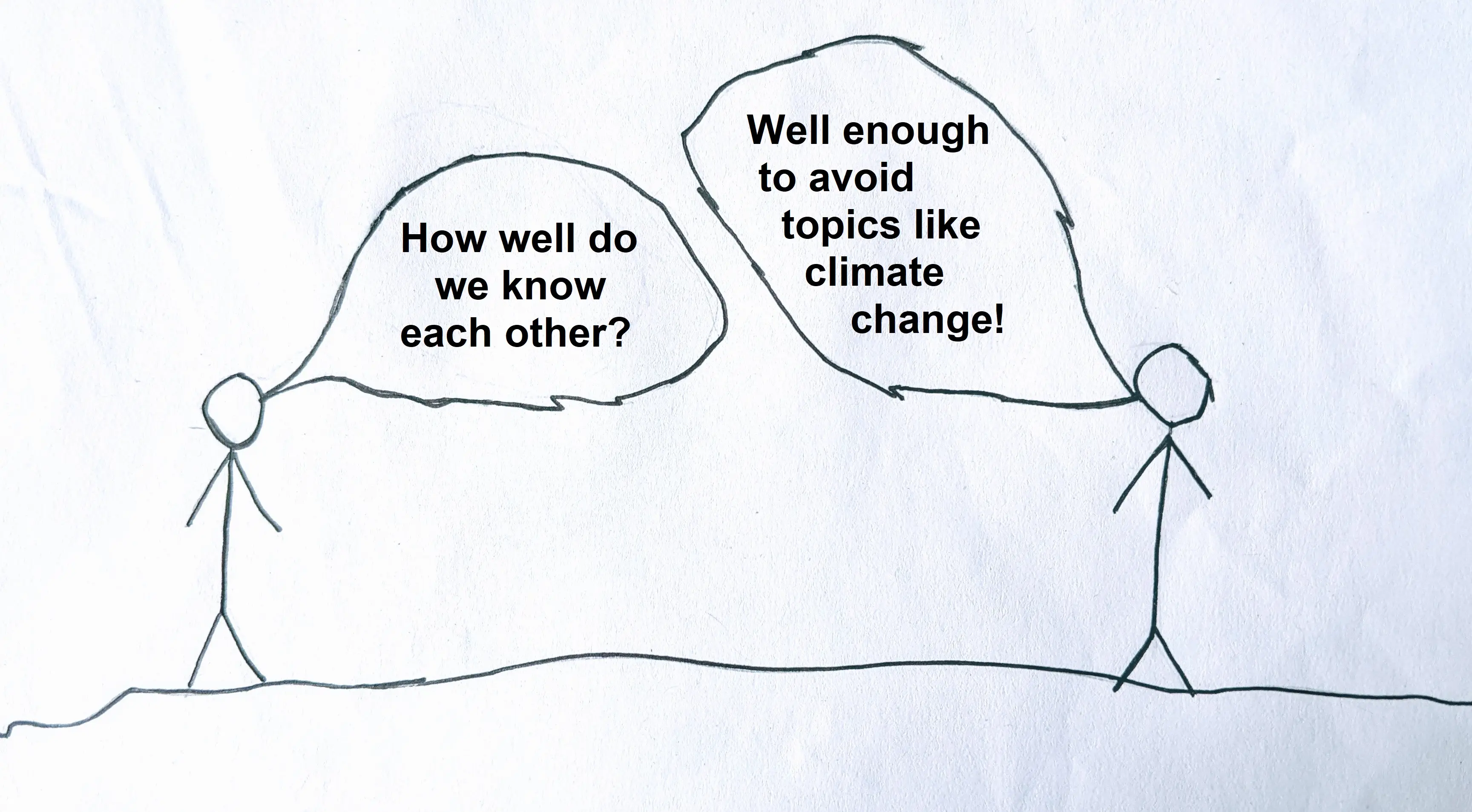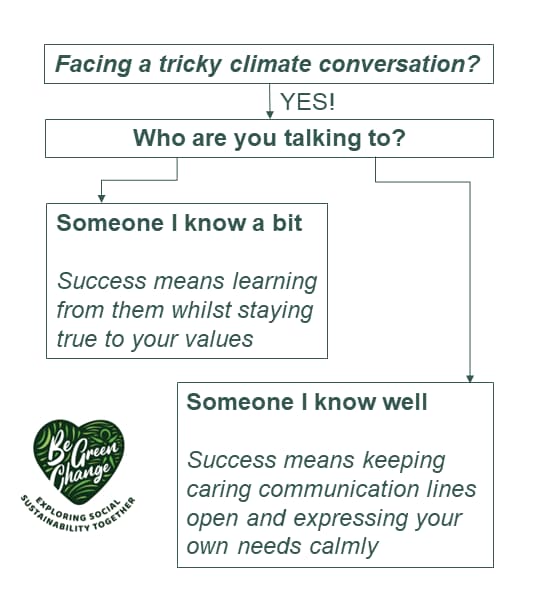New here? Sign up to my newsletter and receive a FREE SET OF POSITIVE TIPS!
The psychology of climate change communication (part 2)
This is page 2 of a 2-page
article on the psychology of climate change communication, and how to have
better sustainability conversations.
You can read page 1 here. There I outline two questions to ask yourself when facing a tricky climate conversation, and I discuss the first question (What are you worried about?).
This page is all about the second question: Who are you talking to?

Question 2: Who are you talking to?
The type of relationship you have with someone, and in particular how close you are to them, affects your communication goals.
Let’s have a think about what goals might work for
conversations with an acquaintance you know a bit, or a loved one you know very well.
Talking with someone
you know a bit
If the person you are interacting with is someone you know a bit but are not really close to, there are two achievable goals you can keep in mind.
Learn from them
For this type of conversation, your own learning is really where it’s at.
See it as a learning experience to understand better what matters to this person, and why they act the way they do. You don’t have to grill them, but every human interaction can help us understand better why people are how they are.
When I find myself really surprised at someone else’s opinion on climate change I try to understand what it is about the situation which has led them to that thinking. What are they concerned about? Often then I find more common ground.
And you might even learn something which gives you a new perspective.
Reflect your values
Just because we aren’t telling someone how to act (as we covered in Question 1) that doesn’t mean we have to pretend certain things don’t matter to us. It’s important not to come away from conversations feeling like you have tacitly approved of things you really don’t think are ok.
This can actually be more about what you don’t say than what you do. Doing this in a gentle way simply means avoiding normal small talk reactions like “oh great!” when people tell you about a high carbon emitting activity they do.
We tend to be more open to information on how to do things differently when we have asked for it, so hold back on telling people about all the climate action you are taking, unsolicited. And people do notice when you take steps to live in low-carbon ways, even if you never talk about it!
The psychology of climate change communication
You don’t know me
When we communicate, we can leave others with a powerful impression that either we really understand them, or conversely, that we don’t have a clue.
The more our communication seems to tell someone else that we don’t understand the reality of their life, maybe by telling them how they 'should' do things, the less attention they are likely to pay to us. And when you think about it, that’s pretty reasonable. Why take advice from someone who seems ignorant of the things which are most important to you?
Often we forget this though, and can feel upset when someone seems to be dismissing our opinions. If this happens to you, remember that maybe there are just some important aspects of their lives which you don’t have much experience of, yet.
Talking with someone
you know well
Alternatively, it could be that the person you are talking to is someone you do know really well.
In this case, here are a couple of goals you may want to keep in mind:
Keep caring communication lines open
One of the most important things in a close relationship is for both sides to feel they can communicate honestly with each other.
So your priority here is for the other person to feel you will act fairly when they talk to you - not ridicule, dismiss or criticise them - and that ultimately you care about them. That’s really a key goal here.
Express your own needs calmly
Although you always want to be supportive, a close relationship also means being honest when something is affecting you. Indeed, knowing climate change is important to you genuinely can motivate your close family and friends to take it much more seriously, because they care about you.
The skill here comes in expressing what is important to you, without projecting your own emotions onto others. Sometimes we imply that other people are the reason we feel anxious, or angry. However, as adults, only we can manage our emotions, they are not other people’s responsibilities.
You can avoid this kind of emotional projection by taking time to reflect on your own before bringing up a tricky issue with a loved one. What is really bothering you, and what do you want to change? If it's something which involves them too, frame it as a challenge you can work together creatively to solve.
If the other person still doesn’t seem to be taking something really important to you seriously, it is ok to put in place boundaries, without getting angry. For example saying that you are not going to fly on a family holiday next summer.
Let’s summarise this:

Use your strengths
I hope the ideas in this 2-page article (here's a link back to page 1) helped you understand the psychology of climate change communication better.
One last thought – when communicating it’s important to be yourself and play to your personal strengths. Some people use humour very skillfully, others are amazingly empathic, and others are brilliant at discussing complex information in detail.
What tips do you have for others when facing tricky climate conversations? I’d love to hear, and feature them in my newsletter.
And remember to celebrate yourself for your willingness to listen and communicate. It does make a difference.
PS. When opinions have ripple effects
The conversations I’ve talked about in this article are everyday ones with a friend, colleague, or family member, in private.
However, there is a different type of interaction we might have, with someone in a position of influence or power, or where you are having the conversation in a public forum.
In this case you may be concerned that wrong opinions could have large ripple effects.
In this situation, it’s important to be able to challenge sensitively and effectively, but also at the right time. This is a skill I’m still working on myself, but I have some initial notes for a future article about it.
Would you be interested in an article on this? Let me know!

I'm Rosie and you can read more about me here.